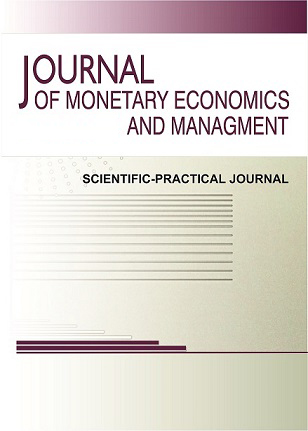graduate student
The article is devoted to analyzing the dynamics of the automotive industry development in the context of increasing competition in the international market. In recent years, the industry has faced a number of challenges, including the need to introduce innovative technologies, changing consumer preferences and environmental requirements. Key factors affecting the competitiveness of manufacturers such as electrification, automation and digitalization are examined. The main focus is on the impact of global economic processes on the development of the automotive industry and the adaptation of companies to new conditions. The study is based on the analysis of scientific literature and practical cases of leading companies. The article emphasizes the need for strategic investment in new technologies to improve competitiveness. The work is relevant for understanding the current trends and prospects of the industry development in the context of globalization.
innovation, automotive industry, electric vehicles, economic growth, competition, business models, automotive industry, international market, electrification, automation, industry development, international business, automotive industry, mergers and acquisitions, sustainable development, corporate governance, enterprise strategy, technological change, industry trends, globalization, competitiveness, investment, production Keywords: capacity, export, import, price competition, market share, domestic market, foreign economic activity, structural changes, capital investments, scientific and technological progress, environmental standards, autonomous vehicles, digitalization, industrial innovations, raw materials, supply chains, public policy, multinational corporations, competitive advantages, development models, strategic alliances, production modernization, environmental sustainability, energy efficiency, risk management
1. Bekker L., Smit A. Tehnologicheskie innovacii i konkurentosposobnost' v avtomobil'noy promyshlennosti // Zhurnal mezhdunarodnyh issledovaniy. – 2019. – № 4. – S. 75–85.
2. Van Der Linden T., Edvards V. Kak Tesla izmenila pravila igry v avtomobil'noy industrii // Harvard Business Review. – 2020. – № 8. – S. 150–160.
3. Gregor N. Ekologicheskaya ekonomika / N. Gregor. – M.: Izdatel'stvo "Ekonomika", 2006. – 320 s.
4. Ivanov A., Petrov V. Ustoychivoe razvitie i ekologicheskaya strategiya avtoproizvoditeley // Vestnik ekologicheskoy ekonomiki. – 2021. – № 2. – S. 58–66.
5. Kotler F. Marketing v sovremennoy industrii / F. Kotler. – M.: Vil'yams, 2010. – 512 s.
6. Li K., Chen M. Vliyanie Industry 4.0 na effektivnost' proizvodstva v avtomobil'noy otrasli // Tehnologicheskiy progress. – 2020. – № 5. – S. 45–55.
7. Mezhdunarodnoe energeticheskoe agentstvo (IEA). Global EV Outlook 2021 // IEA. – 2021. – URL: https://www.iea.org (data obrascheniya: 2025-04-05).
8. O’Konnor Dzh., Makdonal'd P. Strategicheskie al'yansy i ih rol' v razvitii avtosektora // Journal of Business Strategy. – 2019. – № 3. – S. 120–130.
9. Porter M. Konkurenciya / M. Porter. – M.: Izdatel'stvo "Biznes", 1998. – 256 s.
10. Porter M. Konkurentnaya strategiya / M. Porter. – M.: Al'pina Biznes Buks, 2012. – 368 s.
11. Chzhou L., Huan M. Kitayskie avtoproizvoditeli na mirovom rynke: strategii i perspektivy // Mezhdunarodnyy zhurnal biznesa. – 2022. – № 1. – S. 205–215.
12. Yamasina T. Strategiya postoyannyh uluchsheniy v yaponskoy avtomobil'noy promyshlennosti // Ekonomicheskiy zhurnal. – 2018. – № 3. – S. 95–105.
13. Ford Motor Company. Ford's response to COVID-19 // Ford Motor Company, 2020. – URL: https://www.ford.com (data obrascheniya: 2025-04-25).
14. McKinsey & Company. The future of mobility: How the automotive industry can respond to the COVID-19 crisis // McKinsey & Company, 2020. – URL: https://www.mckinsey.com (data obrascheniya: 2025-04-25).
15. Volkswagen AG. Annual Report 2020 // Volkswagen AG. – 2020. – URL: https://www.volkswagenag.com (data obrascheniya: 2025-04-25).









